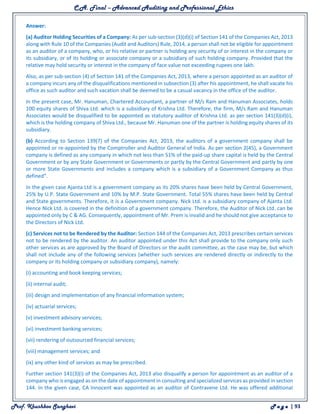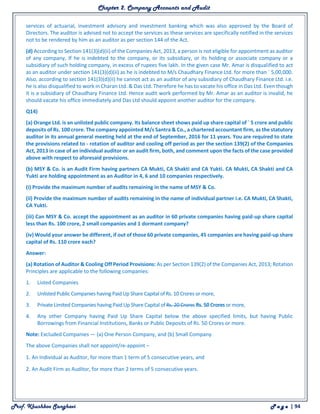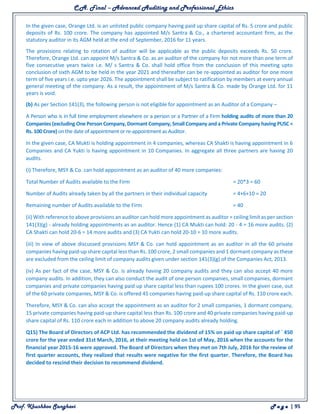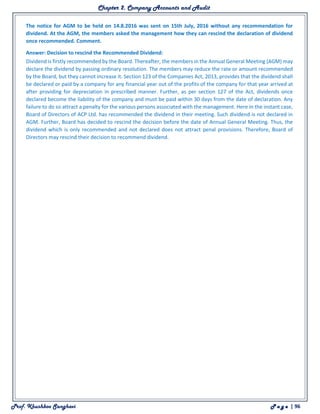The document provides a comprehensive overview of the appointment, removal, and duties of auditors as per Section 139 of the Companies Act, highlighting requirements for government and private companies. It covers the procedures for appointing first auditors, filling casual vacancies, and the implications of audit committee recommendations, as well as the provisions for auditor rotation and removal before the expiry of the term. Key elements include timelines for appointments, eligibility criteria, and the necessary approvals from the board and members at general meetings.
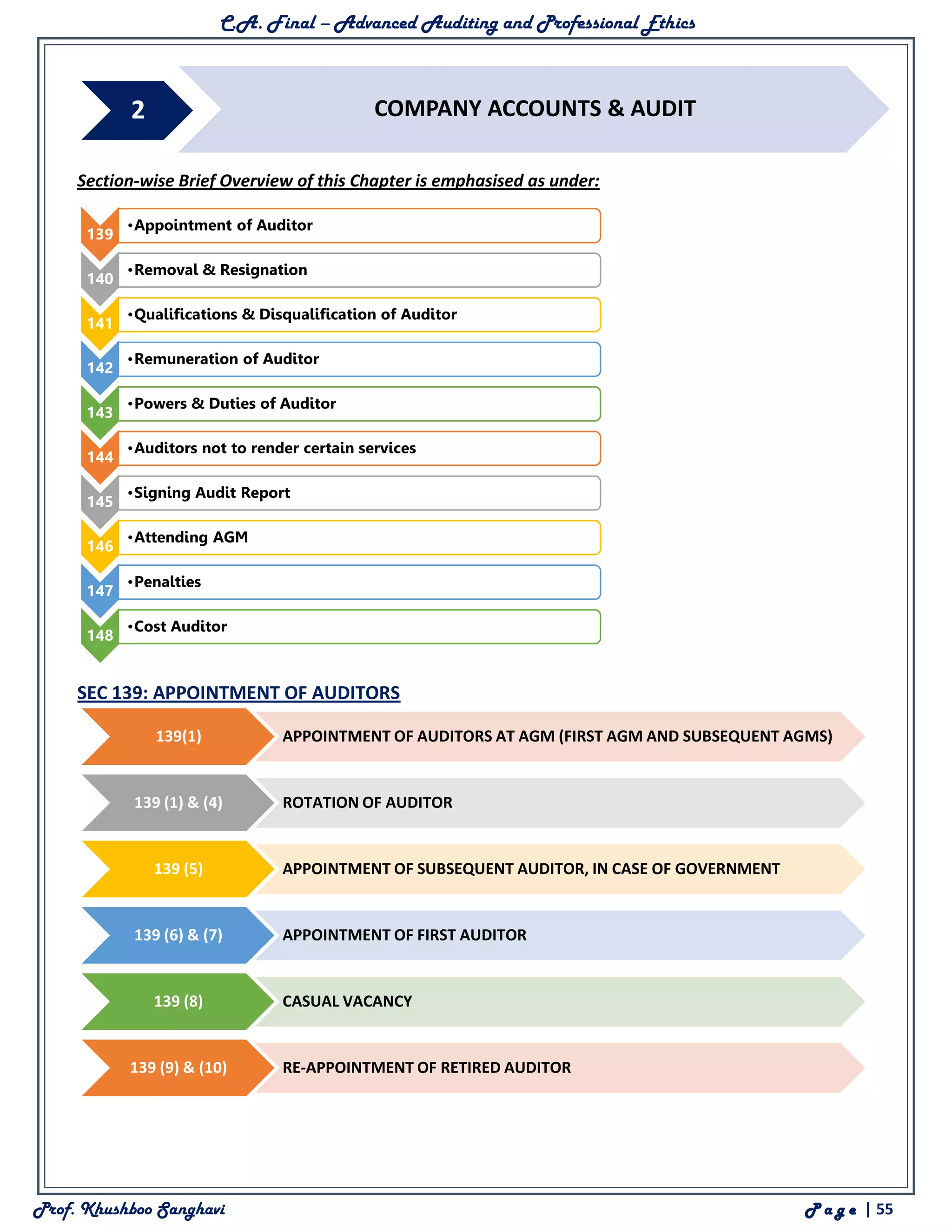
![Chapter 2. Company Accounts and Audit
Prof. Khushboo Sanghavi P a g e | 56
SEC 139
APPOINTMENT OF AUDITOR
APPOINTMENT OF FIRST AUDITORS [SEC. 139(6), 139 (7)]
Provision Sec.139(7) Sec.139(6)
Type of Company
covered
1. Government Companies, or
2. Any other Company owned or controlled,
directly or indirectly, by —
(a) By the Central Government, or
(b) By any State Government or
Governments, or
(c) Partly by the Central Government and
partly by one of more State Governments.
Any other Company
Appointment of First
Auditor
• Appointment by: C&AG of India.
• Time limit: Within 60 days from the date of
registration of the Company.
• Appointment by: Board of
Directors.
• Time Limit: Within 30 days from
the date of registration of the
Company.
In case of failure of
above
The Board of Directors shall appoint the First
Auditor, within the next 30 days.
See next point below.
In case of BOD failure • BOD shall inform the Members of its failure.
• Members shall appoint the Auditor, within 60
days, in an EGM.
• BOD shall inform the Members of
its failure.
• Members shall appoint the
Auditor, within 90 days, in an
EGM.
Tenure First Auditor shall hold office till the conclusion
of the
First AGM.
First Auditor shall hold office till
the conclusion of the
First AGM.
Overriding of The above provisions override Sec. 139(1) &
139(5).
The above provisions override
Sec. 139(1).
APPOINTMENT OF AUDITORS OF GOVERNMENT COMPANIES [SEC 139(5)]
Point Description
Type of Companies 1. Government Companies, or
2. Any other Company owned or controlled, directly or indirectly, by —](https://image.slidesharecdn.com/canotesoncompanyaccountsandaudits-210510200134/85/CA-NOTES-ON-COMPNAY-ACCOUNTS-AND-AUDITS-2-320.jpg)
![C.A. Final – Advanced Auditing and Professional Ethics
Prof. Khushboo Sanghavi P a g e | 57
(a) By the Central Government, or
(b) By any State Government or Governments,
(c) Partly by the Central Government and partly by one of more State
Governments.
Appointment of
Auditors
1. Appointee: Auditor duly qualified to be appointed as Auditor under the Act.
2. Appointment by: Comptroller and Auditor General (C&AG) of India.
3. Time Limit: Within 180 days from the commencement of the financial year.
4. Tenure: To hold office till the conclusion of the AGM.
APPOINTMENT OF AUDITORS AT AGM [SEC. 139(1)]
Point Description
Appointment at
AGM
Every company shall appoint an Individual or a Firm as Auditor of the Company, at its 1st
AGM.
Note:
Appointment includes re-appointment.
Firm includes a Limited Liability Partnership (LLP) incorporated under the
LLP Act, 2008.
Tenure 1. Auditor shall hold the office from the conclusion of 1st
AGM to till the conclusion of its 6th
AGM and thereafter till the conclusion of every 6th
AGM.
2. For the above purpose, the Meeting wherein such appointment has been made will be
counted as the first meeting.
Ratification at
every AGM
1. The Company shall place the matter relating to appointment of Auditors, for ratification by
Members, at every AGM, by way of passing an Ordinary Resolution.
2. If the appointment is not ratified by the Members of the Company at the AGM, the Board
of Directors shall appoint another Individual / Firm as the Auditor(s), after following the
procedure laid down in this behalf under the Act.
Duties of Company
3. The Company should obtain the written consent of the Auditor, and the prescribed
Certificate from the Auditor, before appointing the Auditor.
[Note: See next point for Certificate.]
4. The Company should inform the Auditor about his appointment and file a notice with the
Registrar, within 15 days of the Meeting in which Auditor was appointed, in Form ADT—
1.
5. ADT—1 Contents include details as to Auditors’ — (a) Income Tax PAN, (b) Name, (c)
Membership Number / Firm Registration Number, (d) Address, with City, State and PIN
Code, (e) email id.](https://image.slidesharecdn.com/canotesoncompanyaccountsandaudits-210510200134/85/CA-NOTES-ON-COMPNAY-ACCOUNTS-AND-AUDITS-3-320.jpg)
![Chapter 2. Company Accounts and Audit
Prof. Khushboo Sanghavi P a g e | 58
Contents of
Certificate of
Auditor
1. The Auditor (Individual/Firm), is eligible for appointment, and is not disqualified for
appointment under the Companies Act, the Chartered Accountants Act, 1949 and its
related Rules or Regulations,
2. The proposed appointment is as per the term provided under the Act,
3. The proposed appointment is within the limits laid down by or under the authority of the
Act,
4. The list of proceedings against the Auditor or Audit Firm or any Partner of the Audit Firm
pending with respect to professional matters of conduct, as disclosed in the Certificate,
is true and correct.
Effect of no
appointment
at AGM
If at any AGM, the Auditor is not appointed or re—appointed, the Existing Auditor shall
continue to be the Auditor of the Company. [Sec.139(10)]
MANNER & PROCEDURE FOR SELECTION AND APPOINTMENT OF AUDITOR [SEC 139(1) & RULES]
Situation “A” Where Audit Committee is required to be constituted u/s 177
(i.e. for Listed Companies and other prescribed class(es) of Companies)
Initial Selection of
Auditors by
Committee
The Audit Committee shall recommend to the BOD, the name of an Individual / Firm as
Auditor, after considering the following —
1. Qualifications and Experience of the Individual/Firm.
2. Whether such Qualifications and Experience are commensurate with the size and
requirements of the Company.
3 Order or Pending Proceedings against the Individual/Firm relating to professional matter
of
4. Any other information which the Committee has called for from the
Proposed Auditor.
If Audit Committee
and BOD agree
If the BOD agrees with the recommendation of Audit Committee, the BOD shall —
1. further recommend the appointment to the Members,
2. place the matter for consideration by Members in the AGM.](https://image.slidesharecdn.com/canotesoncompanyaccountsandaudits-210510200134/85/CA-NOTES-ON-COMPNAY-ACCOUNTS-AND-AUDITS-4-320.jpg)
![C.A. Final – Advanced Auditing and Professional Ethics
Prof. Khushboo Sanghavi P a g e | 59
If Audit Committee
and BOD disagree
1. If the BOD disagrees with Audit Committee’s recommendation, it should refer back to
the Audit Committee for its reconsideration, citing the reasons for its disagreement.
2. If the Audit Committee does not reconsider its recommendation, after taking the
reasons given by the BOD, then, the BOD shall —
(a) record the reasons for its disagreement with the Committee.
(b) send its own recommendation for consideration of the Members in
the AGM.
Note: If a Company is required to constitute Audit Committee u/s 177, all appointments, including the filling of a
casual vacancy of an Auditor should be made after considering that Committee’s recommendations. [Sec. 139(11)]
Situation “B”: When there is no requirement as to Audit Committee
The Board of Directors (BOD) shall recommend to the Members in the AGM, the name of an Individual/Firm as
Auditor, after considering the factors mentioned in the Table above in Situation A.](https://image.slidesharecdn.com/canotesoncompanyaccountsandaudits-210510200134/85/CA-NOTES-ON-COMPNAY-ACCOUNTS-AND-AUDITS-5-320.jpg)
![Chapter 2. Company Accounts and Audit
Prof. Khushboo Sanghavi P a g e | 60
CASUAL VACANCY [SEC. 139(8)]
Type of
Company
For Companies whose accounts are subject to audit
by an Auditor appointed by the C&AG
For all other Companies
Filling of Casual
Vacancy
• C&AG shall fill the Casual Vacancy, within 30 days.
• If C&AG does not fill the vacancy within 30 days, the BOD
shall fill the vacancy, within next 30 days.
• Board of Directors shall fill the casual
vacancy, within 30 days.
See Notes below.
Tenure • Till the conclusion of the next AGM. [as per Sec.139(5)]• Till the conclusion of the next AGM
[sec.139(8)]](https://image.slidesharecdn.com/canotesoncompanyaccountsandaudits-210510200134/85/CA-NOTES-ON-COMPNAY-ACCOUNTS-AND-AUDITS-6-320.jpg)
![C.A. Final – Advanced Auditing and Professional Ethics
Prof. Khushboo Sanghavi P a g e | 61
Note:
• If vacancy is caused by resignation, the appointment should also be approved by the Company at a General
Meeting convened within 3 months of BOD recommendation.
• For Companies in which an Audit Committee u/s 177 is required, the recommendations of that Committee shall
also be considered for Casual Vacancy.
RE-APPOINTMENT OF RETIRING AUDITOR [SEC. 139(9)]
Subject to Sec. 139(1), the Retiring Auditor may be re-appointed at an AGM,
if—
1. If the Retiring Auditor is not disqualified for re-appointment,
2. If the Retiring Auditor has not given the Company a notice in writing of his
unwillingness to be re-appointed,
3. If a Special Resolution has not been passed at that AGM, appointing
another Auditor instead of the Retiring Auditor or providing expressly
that the Retiring Auditor shall not be re—appointed.
ROTATION OF AUDITORS [SEC. 139(2), (3), (4), RULES]
Rotation Applicable to
Rotation
Principles
Applicable to
Key Code:
LUPA
(AMENDMENT)
1. Listed Companies
2. Unlisted Public Companies having Paid Up Share Capital of ₹10 Crores or more,
3. Private Limited Companies having Paid Up Share Capital of ₹20 Crores ₹50 Crores or more,
4. Any other Company having Paid Up Share Capital below the above specified limits, but
having Public Borrowings from Financial Institutions, Banks or Public Deposits of ₹ 50 Crores
or more.
Note: Excluded Companies — (a) One Person Company, and (b) Small Company.
Maximum
Tenure of
Auditors
The above Companies shall not appoint/re-appoint –
1. An Individual as Auditor, for more than 1 term of 5 consecutive years, and
2. An Audit Firm as Auditor, for more than 2 terms of 5 consecutive years.
Auditors
Ineligible for
appointment –
Different
Scenarios
1. Cooling Off Period: Any Individual or Audit Firm shall not be eligible for re—appointment as
Auditor in the same Company, for 5 years from the completion of their audit term.
2. Common Partners: Any Audit Firm having common partner(s) on the date of appointment, in the
retiring Audit Firm whose tenure has expired immediately preceding the financial year, shall not
be appointed as Auditor, for a period of 5 years.
3. Old Certifying Partner in New Firm: If a Partner, who is in charge of an Audit Firm and also
certifies the Financial Statements of the Company, retires from the said Firm and joins
another Firm of Chartered Accountants, then such Other Firm is also ineligible to be
appointed for a period of 5 years.](https://image.slidesharecdn.com/canotesoncompanyaccountsandaudits-210510200134/85/CA-NOTES-ON-COMPNAY-ACCOUNTS-AND-AUDITS-7-320.jpg)
![Chapter 2. Company Accounts and Audit
Prof. Khushboo Sanghavi P a g e | 62
4. Same Network Firms: The Incoming Auditor or Audit Firm is not eligible to be appointed, if
it is associated with the Outgoing Auditor or Audit Firm under the same network of Audit
Firms. [Note: “Same Network” includes the Firms functioning, hitherto or in future, under
the same brand name, trade name or common control.]
For Eg. Mr L is a common partner in Firm JKL as well as Firm LMN.
Thus FIRM JKL + FIRM LMN = INELIGIBLE FOR REAPPOINTMENT.
3 Year Time
Period for
Compliance
Every Existing Company which is required to comply with Sec. 139(2), shall comply with the
requirement, within 3 years from the date of commencement of this Act.
Additional
Conditions [Sec.
139(3)]
Subject to the provisions of the Act, the Members of a Company may resolve to provide that —
1. In the Audit Firm appointed by it, the Auditing Partner and his Team shall be rotated at such
intervals, as may be resolved by the Members, or
2. The Audit shall be conducted by more than one Auditor.
Other Points 1. When there is a Rotation of Auditors on expiry of 5—year term, the Audit Committee or BOD
shall follow the Manner and Procedure for Selection and Appointment of Auditors, as
specified u/s 139(1) and Rules above, e.g. consideration of qualifications, etc.
2. A break in the term for a continuous period of 5 years is considered as fulfilling the
requirement of rotation.
3. Sec. 139(2) shall not affect — (a) the right of the Company to remove an Auditor, or (b) the
right of the Auditor to resign his office. Note: This means that the appointment for 5 year
period is not irrevocable, and the Auditor may resign, or Company may remove the Auditor
before that period.
ILLUSTRATION ON ROTATION OF AUDITORS [RULES)
Illustration 1: Illustration explaining Rotation in case of Individual Auditor
Number of consecutive years for which
an Individual Auditor has been
functioning as Auditor in the same
Company [in the first AGM held after
the commencement of provisions of
Sec.139(2)]
Maximum number of consecutive
years for which he may be
appointed in the same Company
(including Transitional Period)
Aggregate period which the
auditor would complete in
the same Company in view
of Column I and II
I II III
5 years (or more than 5 years) 3 years 8 years or more
4 years 3 years 7 years
3 years 3 years 6 years
2 years 3 years 5 years](https://image.slidesharecdn.com/canotesoncompanyaccountsandaudits-210510200134/85/CA-NOTES-ON-COMPNAY-ACCOUNTS-AND-AUDITS-8-320.jpg)
![C.A. Final – Advanced Auditing and Professional Ethics
Prof. Khushboo Sanghavi P a g e | 63
1 years 4 years 5 years
Notes:
1. Individual Auditor shall include other Individuals or Firms whose Name or Trademark or Brand is used by
such individuals, if any.
2. Consecutive years shall mean all the preceding financial years for which the Individual Auditor has been the
Auditor, until there has been a break by five years or more.
Illustration 2 Illustration explaining rotation in case of Audit Firm
Number of consecutive years for
which an audit Firm has been
functioning as Auditor in the same
Company [in the first AGM held
after the commencement of
provisions of Sec.139(2)]
Maximum number of consecutive
years for which the Firm may be
appointed in the same Company
(including Transitional Period)
Aggregate period which the Firm
would complete in the same
Company in view of Column I and
II
I II III
10 years (or more than 10 years) 3 years 13 years or more
9 years 3 years 12 years
8 years 3 years 11 years
7 years 3 years 10 years
6 years - 4 years 10 years
5 years 5 years 10 years
4 years 6 years 10 years
3 years 7 years 10 years
2 years 8 years 10 years
1 years - 9 years 10 years
Notes:
1. Audit Firm shall include other Firms whose Name or Trademark or Brand is used by the Firm or any of its
Partners.
2. Consecutive years shall mean all the preceding financial years for which the Firm has been the Auditor until
there has been a break by five years or more.](https://image.slidesharecdn.com/canotesoncompanyaccountsandaudits-210510200134/85/CA-NOTES-ON-COMPNAY-ACCOUNTS-AND-AUDITS-9-320.jpg)
![Chapter 2. Company Accounts and Audit
Prof. Khushboo Sanghavi P a g e | 64
SEC 140
REMOVAL OF AUDITOR
REMOVAL OF AUDITORS BEFORE EXPIRY OF TERM [SEC. 140(1) AND RULES]
Procedure for
Removal before
expiry of term
1. BOD should pass a Resolution for removal of Auditors.
2. Application should be made to Central Government in Form ADT—2, within 30 days of
BOD Resolution.
3. Previous Approval of Central Government should be obtained, in response to Form ADT—
2.
4. A General Meeting should be held within 60 days of receipt of approval from Central
Government.
5. Special Resolution should be passed in the above General Meeting, for removal of
Auditors.
6. Before taking any action u/s 140(1), the Auditor shall be given a reasonable opportunity
of being heard.
Note: Contents of Form ADT—2 include the following —
1. Grounds of seeking removal of Auditor,
2. Details of Qualifications in Accounts in past 3 years,
3. Details of Opportunity of being heard given to the Auditor,
4. Details of Civil I Criminal Proceedings pending between Company I
Concerned Officers,
5. Special Notice received for Removal of Auditors, if any.
6. Percentage of Capital held by Members who propose removal of Auditors,
7. Whether all due Audit Fees has been paid to the concerned Auditors,
8. Details of Other Services rendered by such Auditors to the Company,
9. Number of years for which audit is pending,
10. Stage of accounts for each financial year, e.g. yet to be approved by Board, or yet to be handed over to
Auditors, etc.
11. Dispute with regard to Books of Accounts in the possession of Auditors but not delivered back to the
Company,
REMOVAL OF AUDITORS AT AGM [SEC.140(4) AND RULES]
This is done by appointing an Auditor other than the Retiring Auditor with the following points —
1. Special Notice: Special Notice is required for a resolution at an AGM for —](https://image.slidesharecdn.com/canotesoncompanyaccountsandaudits-210510200134/85/CA-NOTES-ON-COMPNAY-ACCOUNTS-AND-AUDITS-10-320.jpg)
![C.A. Final – Advanced Auditing and Professional Ethics
Prof. Khushboo Sanghavi P a g e | 65
(a) appointing as Auditor, a person other than the Retiring Auditor, or
(b) providing expressly that the Retiring Auditor shall not be re—appointed.
Note: If the Retiring Auditor has completed a consecutive tenure of 5 years (for Individual) or 10 years (for Firm),
such Special Notice is not required.
2. Copy to Auditor: On receipt of above notice, the Company shall send forthwith a copy thereof to the
Retiring Auditor.
3. Rights of Retiring Auditor: The Retiring Auditor has the following rights —
(a) To make a representation of a reasonable length to the Company,
(b) To request that such representation be circulated among the members,
(c) To require that the representations be read out at the AGM, and he be heard orally at the AGM.
4. Company’s Duties: Where the Retiring Auditor makes a representation in writing to the Members of t.
Company, the Company shall —
(a) state the fact of representations being made, in any notice of the resolution given to Members of the
Company, and
(b) send a copy of representation to every Member of the Company to whom notice of meeting is sent,
whether before or after the receipt of representation by the Company.
Note: The Auditors’ Representations need not be circulated to Members by the Company, if —
(a) The representations are received too late by the Company, or
(b) The Tribunal is satisfied, on the application made by the Company or any other aggrieved person, that
the right of representation is being abused by the Auditor.
If the representation is not sent to the Members, a copy thereof should be filed with the ROC.
CHANGE OF AUDITORS BASED ON TRIBUNAL’S DIRECTION [SEC.140(5)]
Situation Tribunal is satisfied that the Auditor of a Company has, directly or indirectly, —
1. acted in a fraudulent manner, or
2. abetted or colluded in any fraud by, or in relation to, the Company or its Directors or
Officers.
Basis for
Tribunal’s
findings
1. suo-motu by Tribunal, or
2. Application made to Tribunal by Central Government, or
3. Application made to Tribunal by any person concerned.
Order of Tribunal
1. The Tribunal can order the Company to change its Auditors, on the above cited grounds.
2. In case of Application by Central Government, the Tribunal shall make an order within 15
days of receipt of application, that the person shall not function as an Auditor. The Central
Government may appoint another Auditor in his place.](https://image.slidesharecdn.com/canotesoncompanyaccountsandaudits-210510200134/85/CA-NOTES-ON-COMPNAY-ACCOUNTS-AND-AUDITS-11-320.jpg)
![Chapter 2. Company Accounts and Audit
Prof. Khushboo Sanghavi P a g e | 66
Effect of
Tribunal’s Final
Order
1. The Individual/Firm against whom a Final Order u/s 140 is passed by Tribunal, is not eligible
to be appointed as Auditor of any Company for a period of 5 years from the date of the
order.
2. If the order is against any Firm, the liability shall be of the Firm and of every Partner(s) who
have acted in a fraudulent manner, or abetted or colluded in the fraud.
3. The erring Auditors are also liable for action u/s 447.
4. In case of criminal liability of any Audit Firm, the liability other than fine shall devolve only
on the concerned Partner(s) who acted in a fraudulent manner, or abetted or colluded in
the fraud.
RESIGNATION OF AUDITORS (SEC.140(2), (3) AND RULES]
Procedure 1. An Auditor has the right to resign from the Company, before the expiry of his term.
2. The Resigning Auditor should file Form ADT-3, within 30 days of date of resignation.
Form ADT-3 Time
Limit
Form ADT—3 shall be filed with —
1. the Company,
2. the ROC, and also
3. the C&AG in case of Sec. 139(5) Companies.
Form ADT-3
Contents
Form ADT—3 requires detailsto be furnishedin respect of —(a) reasons for resignation,and(b)
any other facts as may be relevant with regard to the resignation.
Non-Compliance If the Auditor fails to furnish Form ADT—3 as above, he is punishable with Fine of
Minimum ₹ 50,000 to Maximum ₹ 5,00,000.
SEC 141
ELIGIBILITY, QUALIFICATIONS & DISQUALIFICATIONS OF AUDITOR
QUALIFICATIONS OF AUDITORS [SEC. 141(1), (2)]
1. A person shall be eligible for appointment as an Auditor of a Company only if
he is a Chartered Accountant.
2. A Firm whereof majority of the Partners practising in India are qualified
for appointment, as aforesaid, may be appointed by its Firm Name to be
the Auditors of a Company.
3. Where a Firm (including a LLP) is appointed as Auditor of the Company,
only the Partners who are Chartered Accountants are authorised to act
and sign on behalf of the firm.](https://image.slidesharecdn.com/canotesoncompanyaccountsandaudits-210510200134/85/CA-NOTES-ON-COMPNAY-ACCOUNTS-AND-AUDITS-12-320.jpg)
![C.A. Final – Advanced Auditing and Professional Ethics
Prof. Khushboo Sanghavi P a g e | 67
DISQUALIFICATIONS OF AUDITORS [SEC. 141(3), (4) AND RULES]
1. Disqualifications [Sec. 141(3)]: The following persons are not eligible for
appointment as an Auditor of a Company –
(a) a Body Corporate other than a Limited Liability Partnership,
(b) an Officer or Employee of the Company,
(c) a Person who is a Partner, or who is in the employment, of an Officer or Employee of
the Company,
(d) a Person who, or his Relative or Partner –
(i) is holding any security of or interest in the Company or is Subsidiary,
Holding or Associate Company or a Subsidiary of such Holding Company. (Note: A Relative may hold
security or interest in the Company of Face Value not exceeding Rs. 1,00,000).
(ii) is indebted to the Company or its Subsidiary, Holding or Associate Company or a Subsidiary of such
Holding Company, in excess of Rs. 5,00,000 or
(iii) has given a guarantee or provided any security in connection with the indebtedness of any third
person to the Company, or its Subsidiary, Holding or Associate Company or a Subsidiary of such Holding
Company, in excess of Rs. 1,00,000.
(e) a Person or a Firm, who, whether directly or indirectly, has business relationship with the Company, or
its Subsidiary, Holding or Associate Company or Subsidiary of such Holding Company or Associate
Company,
(f) a Person whose Relative is a Director or is in the employment of the Company as a Director or Key
Managerial Personnel,
(g) a Person who is in full time employment elsewhere or a person or a Partner of a Firm holding audits of more
than 20 Companies (excluding One Person Company, Dormant Company, Small Company and a Private
Company having PUSC < Rs. 100 Crore) on the date of appointment or re-appointment as Auditor.
(h) a Person who has been convicted by a Court, of an offence involving fraud, and a period of 10 years
has not elapsed from the date of such conviction,
(i) any Person whose Subsidiary or Associate Company or any other form of Entity, is engaged as on the date
of appointment, in consulting and specialised services as provided in Sec.144.
Note: For, the purposes of Point (e) above, Business Relationship all be construed as any transaction
entered into for a commercial purpose, except -
(a) Commercial Transactions, which, are in the nature of Professional Services permitted to be
rendered by an Auditor or Audit Firm under the Companies Act or CA Act and Rule/ Regulations
thereunder.
(b) Commercial Transactions in the ordinary course of business of the Company at Arm’s Length
Price, like sale of products or services to the Auditor, as Customer, in the ordinary course of
business, by Companies engaged in the business of telecommunications,, airlines, hospitals,
hotels and such other similar businesses.](https://image.slidesharecdn.com/canotesoncompanyaccountsandaudits-210510200134/85/CA-NOTES-ON-COMPNAY-ACCOUNTS-AND-AUDITS-13-320.jpg)
![Chapter 2. Company Accounts and Audit
Prof. Khushboo Sanghavi P a g e | 68
2. Subsequent Disqualification = Casual Vacancy: If an Auditor, after his appointment, becomes subject to
any of the above disqualifications, he shall be deemed to have automatically vacated his office and that
vacancy shall be considered to be a Casual Vacancy. [Sec.141(4)]
SEC 144
AUDITOR NOT TO RENDER CERTAIN SERVICES
1. Only Approved Services: An Auditor of the Company can provide only those Other
Services as approved by the Board of Directors or the Audit Committee.
2. Prohibited Services: The following services shall not be provided by an Auditor
directly or indirectly to the Company or its Holding Company or Subsidiary
Company —
(a) Accounting and Book Keeping Services,
(b) Actuarial Services,
(c) Management Services,
(d) Investment Advisory Services,
(e) Investment Banking Services,
(f) Internal Audit,
(g) Rendering of Outsourced Financial Services,
(h) Design and Implementation of any Financial Information System,
(i) Any other kind of Services as may be prescribed.
3. 1 Year Timeframe: An Existing Auditor which renders any of the non-audit services, shall comply with Sec.
144 before the closure of the first financial year after the date of commencement of
this Act.
4. Meanings: The term “directly or indirectly” includes rendering of services by the Auditor —
In case of Auditor being am Individual In case of Auditor being an Audit Firm
(a) either himself, or (a) either itself, or
(b) through his Relative, or (b) through any of its Partners, or
(c) any other person connected or associated with such
Individual, or
(c) through its Parent, Subsidiary or Associate Entity,
or
(d) through any other entity, in which such Individual
has significant influence or control, or whose
(d) through any other Entity, in which the Firm or any
Partner of the Firm has significant influence or
KEY CODE AAMI3R in Dangal](https://image.slidesharecdn.com/canotesoncompanyaccountsandaudits-210510200134/85/CA-NOTES-ON-COMPNAY-ACCOUNTS-AND-AUDITS-14-320.jpg)
![C.A. Final – Advanced Auditing and Professional Ethics
Prof. Khushboo Sanghavi P a g e | 69
Name or Trademark of Brand is used by such
Individual,
control, or whose Name or Trademark or Brand is
used by the Firm or any of its Partners.
SEC 142
REMUNERATION OF AUDITOR
1. The Remuneration of the Auditor shall be fixed by the Members — (a) in its
General Meeting, or (b) in such manner as may be determined at the
Meeting.
2. Remuneration of the First Auditor may be fixed by the Board of Directors.
3. Remuneration includes —
(a) Fees Payable to the Auditor,
(b) Expenses if any, incurred by the Auditor in connection with the audit
and any facility extended to the Auditor.
4. However, Remuneration does not include amount paid for any other
service rendered by the Auditor at the request of the Company.
SEC 143: RIGHTS AND DUTIES OF AUDITOR
PART A: RIGHTS
RIGHT OF ACCESS TO BOOKS AND VOUCHERS [SEC. 143(1)(a)]:
(a) The Company Auditor shall have a right of access at all times to the books of accounts
and vouchers of the Company, whether kept at the Registered Office of the Company or
elsewhere.
(b) The Auditor of a Holding Company shall also have the right of access to the records of all its Subsidiaries in so
far as it relates to the consolidation of its Financial Statements
RIGHT TO OBTAIN INFORMATION AND EXPLANATIONS [SEC. 143(1)(b)]:
The Company Auditor is entitled to require from the Officers of the Company, such information and explanations
as the Auditor may think necessary for the performance of his duties.
RIGHT TO LIEN [SEC. 143(1)(e)]
In terms of the general principles of law, any person having the lawful possession of somebody else’s property, on
which he has worked, may retain the property for non-payment of his dues on account of the work done on the
property. On this premise, auditor can exercise lien on books and documents placed at his possession by the client
for non-payment of fees, for work done on the books and documents.
Under section 128 of the Act, books of account of a company must be kept at the registered office. These provisions
ordinarily make it impracticable for the auditor to have possession of the books and documents. The company
provides reasonable facility to auditor for inspection of the books of account by directors and others authorised to](https://image.slidesharecdn.com/canotesoncompanyaccountsandaudits-210510200134/85/CA-NOTES-ON-COMPNAY-ACCOUNTS-AND-AUDITS-15-320.jpg)
![Chapter 2. Company Accounts and Audit
Prof. Khushboo Sanghavi P a g e | 70
inspect under the Act. Taking an overall view of the matter, it seems that though legally, auditor may exercise right
of lien in cases of companies, it is mostly impracticable for legal and practicable constraints. His working papers
being his own property, the question of lien, on them does not arise.
SA 230 issued by ICAI on Audit Documentation (explanatory text, A- 25), “Standard on Quality Control (SQC) 1,
“Quality Control for Firms that Perform Audits and Reviews of Historical Financial Information, and Other Assurance
and Related Services Engagements”, issued by the Institute, provides that, unless otherwise specified by law or
regulation, audit documentation is the property of the auditor. He may at his discretion, make portions of, or
extracts from, audit documentation available to clients, provided such disclosure does not undermine the validity
of the work performed, or, in the case of assurance engagements, the independence of the auditor or of his
personnel.”
RIGHT TO HAVE QUALIFICATIONS, ETC. READ OUT AT GENERAL MEETING [SEC. 145]:
Qualifications, Observations or Comments on the Financial Transactions or matters, which have any adverse effect
on the functioning of the Company mentioned in the Auditor’s Report, shall be —
(a) read before the Company in its General Meeting.
(b) open for inspection by any Member of the Company.
RIGHT TO RECEIVE NOTICES AND TO ATTEND GENERAL MEETINGS [SEC 146]:
(a) All Notices of and other communications relating to, any General Meeting of a Company should be
forwarded to the Auditors of a Company.
(b) The Auditor shall be entitled to attend any General Meeting and to be heard at any General Meeting, which
concerns him as Auditor.
(c) Unless otherwise exempted by the Company, the Auditor shall attend the General Meeting —
• either by himself, or
• through his Authorised Representative, who shall also be qualified to be an Auditor.
Note: Thus, it is also the duty of the Auditor to attend the General Meeting.
SEC 143: RIGHTS AND DUTIES OF AUDITOR
PART B: DUTIES
INQUIRY INTO SPECIFIED AREAS [SEC. 143(1)]:
The Company Auditor shall inquire into the following aspects —
(a) Whether Loans and Advances made by the Company on the basis of security have been properly secured and
whether the terms on which they have been made are prejudicial to the interests of the Company or its
Members,
(b) Whether transactions of the Company, which are represented merely by Book Entries, are prejudicial to the
interests of the Company,
(c) Where the Company is not an Investment Company or Banking Company, whether Assets of the Company
consisting of Shares, Debentures, and other Securities nave been sold at a price less than that at which they
were purchased by the Company.](https://image.slidesharecdn.com/canotesoncompanyaccountsandaudits-210510200134/85/CA-NOTES-ON-COMPNAY-ACCOUNTS-AND-AUDITS-16-320.jpg)
![C.A. Final – Advanced Auditing and Professional Ethics
Prof. Khushboo Sanghavi P a g e | 71
(d) Whether Loans and Advances made by the Company have been shown as Deposits,
(e) Whether Personal Expenses have been charged to Revenue Account,
(f) Where any Shares have been allotted for cash, whether cash has actually been received, and if no cash has
been received, whether the position as stated in the account books and the Balance Sheet is correct, regular
and not misleading.
REPORTING AS TO TRUE AND FAIR [SEC. 143(2)]:
Items reported on
The Auditor shall make a Report to the Members of the Company — Items
(a) on the accounts examined by him, and
(b) on every Financial Statements which are required by or under this Act to be laid
before the Company in General Meeting.
Reporting
Considerations
The Report shall be made after taking into account, the following —
(a) the provisions of the Act,
(b) the accounting and auditing Standards,
(c) matters which are required to be included in the Audit Report under the
provisions of the Act / Rules / Order u/s 143(11)
(d) best of his information and knowledge.
Essence of Report In addition to other reporting matters, the Audit Report shall state whether the
said Accounts, Financial Statements, give a true and fair view of —
(a) the state of the Company’s affairs as at the end of the financial year,
(b) Profit or Loss,
(c) Cash Flow for the year.
REPORTING REQUIREMENTS [SEC. 143(3)]:
The Auditor’s Report shall also state —
(a) Whether he has sought and obtained all information and explanations to the best of his knowledge and
belief that are necessary for the purpose of his audit. If the required information is not obtained, details and
effect in Financial Statements should be mentioned.
(b) Whether, in his opinion, proper books of account as required by law have been kept by the Company so far
as appears from his examination of those books and proper returns adequate for the purposes of his audit
have been received from Branches not visited by him,
(c) Whether the report on the accounts of any Branch Office audited by a person other than the Company
Auditor has been forwarded to him and how he has dealt with the same in preparing the Auditor’s Report,
(d) Whether the Company’s Balance Sheet and Profit and Loss account dealt with in the report are in agreement
with the books of account and returns,](https://image.slidesharecdn.com/canotesoncompanyaccountsandaudits-210510200134/85/CA-NOTES-ON-COMPNAY-ACCOUNTS-AND-AUDITS-17-320.jpg)
![Chapter 2. Company Accounts and Audit
Prof. Khushboo Sanghavi P a g e | 72
(e) Whether, in his opinion, the Financial Statements comply with the Accounting Standards, the observations
or comments of the Auditors on financial transactions or matters which have any adverse effect on the
functioning of the company,
(f) Whether any Director is disqualified from being appointed as a Director u/s 164(2),
(g) any Qualification, Reservation or Adverse Remark relating to the maintenance of accounts and other matters
connected therewith,
(h) Whether the Company has adequate Internal Financial Controls system in place and the operating
effectiveness of such controls,
(i) Other matters as may be prescribed —
(i) whether the Company has disclosed the impact, if any, of pending litigations on its financial position in its
Financial Statement,
(ii) whether the Company has made provision, as required under any law or Accounting Standards, for material
foreseeable losses, if any, on long—term contracts including Derivative Contracts,
(iii) whether there has been any delay in transferring amounts, required to be transferred, to the Investor
Education and Protection Fund by the Company.
REASONS FOR NEGATIVE QUALIFICATION [SEC. 143(4)]:
(a) In case of Negative Remark or Qualification in any of the reporting matters u/s 143, the Audit Report shall
state the reasons therefor.
(b) Qualifications, Observations or Comments on the Financial Transactions or matters, which have any adverse
effect on the functioning of the Company mentioned in the Auditor’s Report, shall be —
• read before the Company in its General Meeting.
• open for inspection by any Member of the Company. [Sec. 145]
DUTIES W.R.T. AUDIT OF GOVERNMENT COMPANIES [SEC. 143(5), (6), (7)]:
Directions by C& AG The C & AG of India can issue directions to the Statutory Auditors on the manner in
which the by C&AG accounts are required to be audited, in case of Auditor s appointed
by C&AG u/s 139(5) or 139(7).
Audit Report The Auditor shall submit a copy of the Audit Report to C&AG. In addition to the matters
u/s 143, the report shall include the following additional points —
(a) Directions issued by C&AG,
(b) Actions taken thereon, and
(c) Its impact on the Accounts and Financial Statement of the Company.
Supplementary Audit Within 60 days from the receipt of above Audit Report the C&AG have right to —
(a) Conduct a Supplementary Audit of the accounts with the help of authorized persons.
C&AG shall also direct persons to provide additional information and other details for
conducting supplementary audit.](https://image.slidesharecdn.com/canotesoncompanyaccountsandaudits-210510200134/85/CA-NOTES-ON-COMPNAY-ACCOUNTS-AND-AUDITS-18-320.jpg)
![C.A. Final – Advanced Auditing and Professional Ethics
Prof. Khushboo Sanghavi P a g e | 73
(b) Comment upon or supplement the Audit Report.
Comments of C&AG (a) The comments or supplement given by C&AG on the Audit Report shall be sent to the
Company.
(b) The Company shall forward the same to every person entitled to copies of Financial
Statements u/s 136(1).
(c) The comments/supplement shall also be placed in the AGM similar to that of the Audit
Report.
Test Audit (a) The C&AG, if it deems fit, may order for conduct of Test Audit in case of a Company
covered u/s 139(5) or 139(7).
(b) The provisions of Sec.19A of the Comptroller and Auditor—General’s (Duties, Powers
and Conditions of Service) Act, 1971, shall apply to the report of such test audit.
COMPLIANCE WITH AUDITING STANDARDS [SEC.143(9), (10)]
(a) Every Auditor shall comply with the Auditing Standards.
(b) The Central Government may prescribe the Standards of Auditing, as recommended by the ICAI, in
consultation with and after examination of the recommendations made by the National Financial Reporting
Authority.
(c) Till such Auditing Standards are notified, Standards of Auditing specified by the ICAI shall be deemed to be
the Auditing Standards.
ADDITIONAL MATTERS REPORTING PER NAFRA [SEC. 143(11)]:
In consultation with the National Financial Reporting Authority (NAFRA), the Central Government may order for the
inclusion of a Statement on specified matters in the Auditor’s Report for specified class or description of Companies.
REPORTING OF FRAUDS [SEC. 143(12), (13), (15)]:
Situation If the Company Auditor, in the course of performance of his duties, has reason to believe that
an offence involving fraud is being or has been committed against the Company, by Officers or
Employees of the Company.
Auditors’ Duties Sub-section (12) of section 143 of the Companies Act, 2013 furthermore prescribes that
the companies, whose auditors have reported frauds under this sub - section (12) to the
audit committee or the Board, but not reported to the Central Government, shall disclose
the details about such frauds in the Board's report in such manner as may be prescribed.
In this regard, sub-rule (4) of Rule 13 of the Companies (Audit and Auditors) Rules, 2014
states that the company is required to disclose in the Board’s Report the following details
of each of the fraud reported to the Audit Committee or the Board under sub-rule (3)
during the year:
(a) Nature of Fraud with description;
(b) Approximate Amount involved;
(c) Parties involved, if remedial action not taken; and
(d) Remedial actions taken.](https://image.slidesharecdn.com/canotesoncompanyaccountsandaudits-210510200134/85/CA-NOTES-ON-COMPNAY-ACCOUNTS-AND-AUDITS-19-320.jpg)
![Chapter 2. Company Accounts and Audit
Prof. Khushboo Sanghavi P a g e | 74
Report Requirements
(a) Sent to: The Secretary, Ministry of Corporate Affairs, in a
sealed cover.
(b) Mode: Registered Post with Acknowledgement Due, or by Speed post, followed by an e—
mail in confirmation thereof.
(c) Stationery: Report shall be in Auditors’ Letterhead, containing his Membership Number,
Postal Address, Email Address and Contact Number. It shall be signed and sealed by
Auditor.
(d) Format: Report shall be in Form ADT—4.
ADT-4 Contents (a) Full details of suspected offence involving fraud (with documents
in support),
(b) Particulars of Officers/Employees who are suspected to be involved in the offence,
(c) Basis on which fraud is suspected,
(d) Period during which the suspected fraud has occurred,
(e) Date of sending report to BOD/Audit Committee, and Date of reply, if any, received,
(f) Whether Auditor is satisfied with the reply/observations of BOD/Audit Committee,
(g) Estimated amount involved in the suspected fraud,
(h) Steps taken by the Company, if any, in this regard, with full details of references.
Good faith
[Sec. 143(13)]
No duty to which the Company Auditor may be subject to shall be regarded as having
been contravened by reason of his reporting the matter referred u/s 143(12), if it is done
in good faith.
Contravention (a) Persons: Auditor/cost Accountant I Company Secretary, who do not comply with Sec.
143(12)
(b) Punishment: Fine of Minimum ₹ 1,00,000 Maximum ₹ 25,00,000.
Note: Cost Audit/Secretarial Audit [Sec.143(14)]: Sec.143 (in entirety) shall be applicable for—
(a) A Cost Accountant in Practice, conducting Cost Audit u/s 148, and
(b) A Company Secretary in Practice, conducting Secretarial Audit u/s 204.](https://image.slidesharecdn.com/canotesoncompanyaccountsandaudits-210510200134/85/CA-NOTES-ON-COMPNAY-ACCOUNTS-AND-AUDITS-20-320.jpg)
![C.A. Final – Advanced Auditing and Professional Ethics
Prof. Khushboo Sanghavi P a g e | 75
SEC 145
SIGNING AUDIT REPORT
(a) The person appointed as Auditor of the Company shall — (i) sign the Auditor’s Report, and (ii) sign or certify
any other document of the Company as per Sec. 141(2).
(b) If a Firm is appointed as Auditor of the Company, signing or certification shall be done only by the Chartered
Accountants who are Partners and are authorised to act and sign on behalf of the Firm.
FRAUD REPORTING
[SECTION 143(12) OF COMPANIES ACT, 2013 & RULE 13 OF CAAR, 2014]
Fraud involving amount of
less than Rs. 1 crore
Fraud involving amount of
Rs. 1 crore or above
Auditor to Report Central
Government in following
manner:
Auditor to Report
Board/ Audit
Committee
Company bound to
disclose certain specified
details in Board's Report
as:
(a) Nature of Fraud
with description;
(b) Approximate
amount involved;
(c) Parties involved, if
remedial action not
taken; and
(d) Remedial actions
taken.
Within 2 days of knowledge
of fraud, Report to Board/
Audit Committee
Within 2 days of
knowledge of
fraud, Report the
following
matters:
(a) Nature of
Fraud with
description
;
(b) Approxima
te amount
involved;
and
(c) Parties
Seek Reply within 45 Days
Reply/observations
received within stipulated
time
Reply/observations not
received within stipulated
time
Forward
Report+Reply/
observations+Comments
to CG within 15 days of
receipt of such
reply/observations
Forward
Report+Note containing
details of report for which
failed to receive any
reply/observations to CG](https://image.slidesharecdn.com/canotesoncompanyaccountsandaudits-210510200134/85/CA-NOTES-ON-COMPNAY-ACCOUNTS-AND-AUDITS-21-320.jpg)
![Chapter 2. Company Accounts and Audit
Prof. Khushboo Sanghavi P a g e | 76
PUNISHMENT FOR CONTRAVENTION [SEC. 147]
Sec. Nature of
Act/Omission
Person punishable Punishment
147 (1) Contravention of
Sec. 139 to Sec. 146
(a) Company Find of Minimum Rs. 25,000 Maximum
Rs. 5,00,000
(b) Every Officer in
Default
Imprisonment of Maximum 1 Year, or
Find of Minimum Rs. 10,000 Maximum ₹
1,00,000, or
Both of the above.
147(2) Contravention of
Sec. 139, 143, 144, 145
Auditor (a) Normal: Find of Minimum
Rs. 25,000 Maximum Rs. 5,00,000.
(b) If done knowingly or willfully, with
intention to deceive the Company or its
Shareholders or Creditors or Tax
Authorities:
Imprisonment of Maximum
1 Year, or
Find of Minimum Rs. 1,00,000 Maximum
Rs. 25,00,000, or
Both of the above
Notes: Additional Liability of Auditor [Sec. 147(3), (4)]
1. If the Auditor is convicted u/s 147(2), he shall be liable to —
(a) refund the remuneration received by him to the Company, and
(b) pay for damages to the Company, Statutory Bodies or Authorities or to any other persons for loss arising out
of incorrect or misleading statements made in his Audit Report.
2. The Central Government can notify any Statutory Body/Authority/Officer, to ensure prompt payment of
damages to the Company or other entitled parties, and to file a report for compliance.
Joint and Several Liability in case of Audit by Firm [Sec. 147(5)]
Situation Where it is proved that the Partner or Partners of the Audit Firm has or have —
(a) acted in a fraudulent manner, or
(b) abetted or colluded in any fraud by, or in relation to or by, the Company or its Directors
or Officers
Liability The civil or criminal liability, as provided in this Act or in any other law, for such act shall
he of the Partner or Partners concerned of the Audit Firm and of the Firm jointly and
severally.](https://image.slidesharecdn.com/canotesoncompanyaccountsandaudits-210510200134/85/CA-NOTES-ON-COMPNAY-ACCOUNTS-AND-AUDITS-22-320.jpg)
![C.A. Final – Advanced Auditing and Professional Ethics
Prof. Khushboo Sanghavi P a g e | 77
AUDIT OF BRANCHES [SEC. 143(8), RULES]
1. Qualifications: The following persons are eligible for appointment as Branch Auditors –
In case of Local Branches In case of Foreign Branches
(a) The Company’s Auditor appointed u/s 139,
or
(a) The Company’s Auditor appointed u/s 139, or
(b) A person qualified for appointment as an
Auditor u/s 139.
(b) An Accountant or other person duly qualified to act as
an Auditor in accordance with the laws of that foreign
country.
2. Audit Report of Branch:
(a) The Branch Auditor shall prepare a Report on the accounts of the Branch Office examined by him.
(b) The Branch Auditor shall submit his report to the Company’s Auditor, who shall deal with it in the manner
required to finalise his Audit Report.
3. Duties and Powers of Company and Branch Auditor: The duties and powers of the Company’s Auditor with
reference to the audit of the Branch, and the Branch Auditor, if any, shall be as contained In Sec. 143(1) to
143(4).
4. Frauds at Branch: Sec.143(12) along with Rules, relating to reporting extend to Branch Auditor, to the
extent it relates to the concerned Branch.
Cost Audit [Sec.148]
MAINTENANCE OF COST ACCOUNTS/RECORDS [SEC. 148(1)]:
(a) The central Government can order for maintenance of cost Accounts / Records.
(b) Cost Accounts / Records shall comprise particulars relating to — (i) utilisation of material or labour, or (ii)
other items of cost as may be prescribed.
(c) Such order may be for specified class of Companies, engaged in — (i) production of specified goods, or (ii)
providing prescribed services.
(d) For such Companies, the books of account shall include these Cost Accounts / Records.
(e) In case of Companies regulated under a Special Act, the Central Government shall consult that Regulatory
Body established under that Act, before ordering maintenance of Cost Records.
COST AUDIT [SEC. 148(2)]:
(a) The Central Government may, if it feels necessary, direct by an order that an audit of the Cost Records kept
by a Company shall be conducted in the prescribed manner.
(b) Such order relating to Cost Audit shall be given in case of Companies —
• which are covered u/s 148(1), i.e. maintenance of Cost Records / Accounts, and,
• which have a Net Worth or Turnover of prescribed amounts.](https://image.slidesharecdn.com/canotesoncompanyaccountsandaudits-210510200134/85/CA-NOTES-ON-COMPNAY-ACCOUNTS-AND-AUDITS-23-320.jpg)
![Chapter 2. Company Accounts and Audit
Prof. Khushboo Sanghavi P a g e | 78
COST AUDITOR [SEC. 148(3)]:
(a) Cost Audit shall be conducted by a Cost Accountant in practice (either Individual or Firm)
(b) A Statutory Auditor of the Company u/s 139 cannot be a Cost Auditor of the Company.
(c) Cost Auditor shall comply with the Cost Auditing Standards issued by the Institute of Cost and Works
Accountants of India, with the approval of the Central Government.
(d) The appointment and remuneration of Cost Accountant is as under —
Situation If Audit Committee is required
u/s 177
No Requirement as to Audit
Committee
Appointment By Board, on the recommendations of
the Audit Committee.
By Board, on its own.
Remuneration • Recommended by Audit Committee,
• Approved by Board of Directors, and
• Ratified by Shareholders.
• Fixed by Board of Directors, and
• Ratified by Shareholders.
(e) Cost Audit shall be in addition to the audit conducted u/s 143.
RIGHTS, ETC. OF COST AUDITOR [SEC. 148(5)]:
(a) The Qualifications, Disqualifications, Rights, Duties and Obligations applicable to Auditors under Chapter X,
are applicable to Cost Auditor also.
(b) The Company is duty bound to give all assistance and facilities to the Cost Auditor for auditing the Cost
Records.
COST AUDIT REPORT [SEC. 148(5), (6), (7)]:
(a) The Cost Auditor shall submit his report to the Board of Directors of the Company.
(b) Within 30 days from the receipt of Cost Audit Report, the Company shall furnish full information and
explanation on every reservation or qualification contained in the Cost Audit Report, to the Central
Government.
(c) If Central Government calls for further information and explanations, the Company should furnish the same
within the timeframe specified by Central Government.
NON-COMPLIANCE [SEC. 148(8)]:
(a) The Company / Officer in Default is punishable in the manner provided in Sec. 147(1).
(b) The Cost Auditor is punishable in the manner provided in Sec. 147(2) to (4).](https://image.slidesharecdn.com/canotesoncompanyaccountsandaudits-210510200134/85/CA-NOTES-ON-COMPNAY-ACCOUNTS-AND-AUDITS-24-320.jpg)
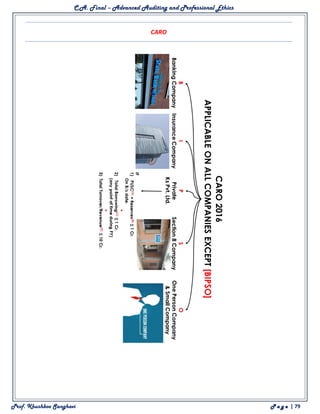
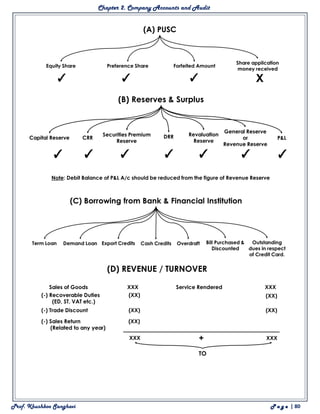
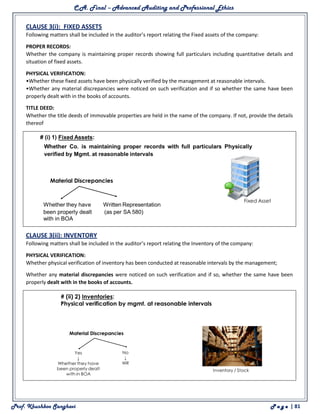
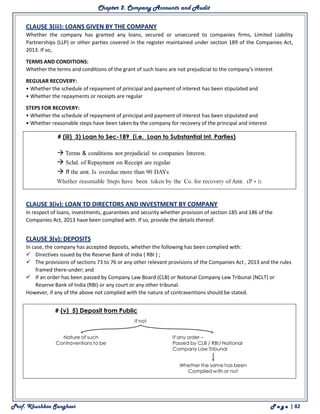
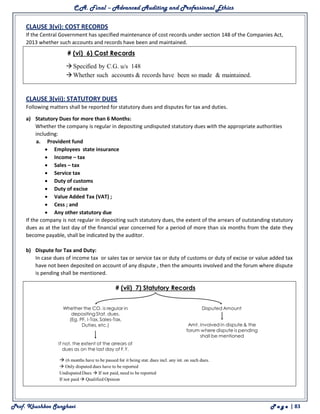
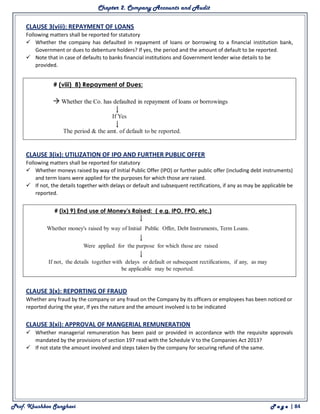
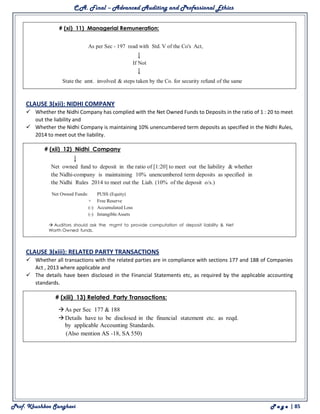
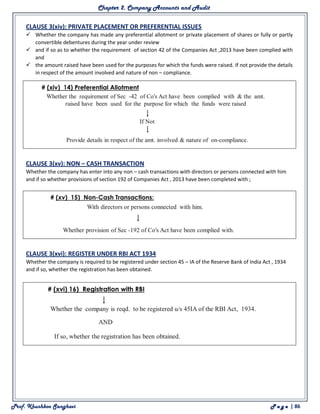
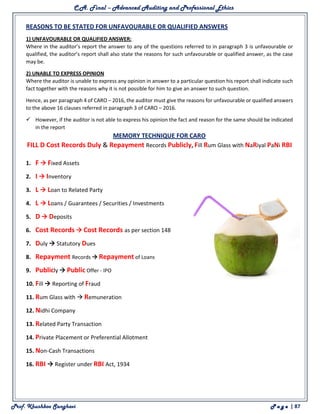
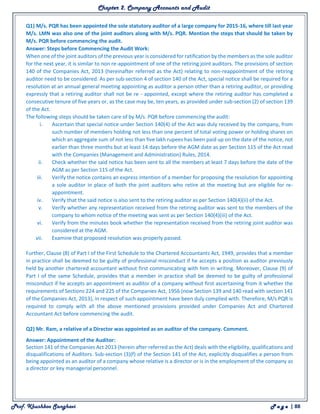

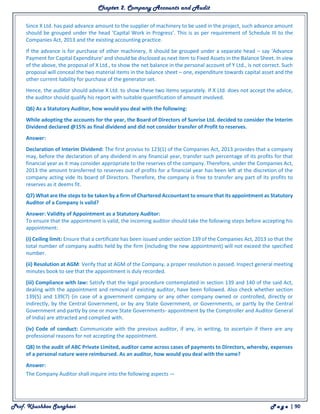
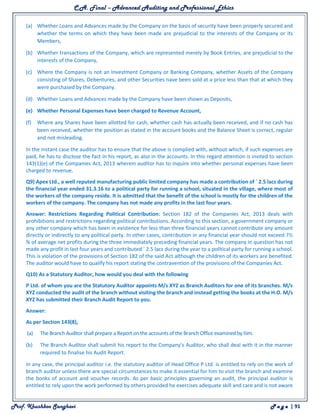
![Chapter 2. Company Accounts and Audit
Prof. Khushboo Sanghavi P a g e | 92
of any reason to believe that he should not have so relied. As per SA 600, “Using the work of another auditor”, the
principal auditor is not required to evaluate professional competence because branch auditor happens to be
member of ICAI. The statutory auditor is also required to deal with the Branch Auditor’s report in the manner, he
considers necessary. Therefore, the statutory auditor is required to deal with M/s XYZ’s report in the manner it
considers fit under the circumstances.
Q11) Miranda Spinning Mills Ltd. is a sick company and has accumulated losses of Rs. 10 crores. The company
has Rs. 12 crores in its share Premium Account. The Management desires to adjust the accumulated losses against
the share premium balance. Advise the company giving your reasons.
Answer:
Application of Securities Premium Account [Sec 52(2)]
1) Issue of fully paid up bonus shares.
2) To write off preliminary expenses of the Company.
3) To write off issue related expenses (E.g. Commission, brokerage, etc.)
4) Buyback u/s 68.
5) For providing for premium on redemption.
In view of these provisions of the Companies Act, 2013, it is not permitted to adjust its accumulated losses against
the securities premium account.
Q12) R and M is an audit firm having partners CA. R, CA. M and CA. G. Mr. S is the relative of CA. R holding shares
of STP Ltd. having a face value of Rs. 1,51,000. Whether CA. R and CA. M are qualified to be appointed as auditors
of STP Ltd.?
Answer: Holding of Shares by Relative of Partner:
As per section 141(3)(d)(i) of the Companies Act, 2013, a person shall not be eligible for appointment as an auditor
of a company, who, or his relative or partner is holding any security of or interest in the company or its subsidiary,
or of its holding or associate company or a subsidiary of such holding company. Further as per proviso to this
Section, the relative of the auditor may hold the securities or interest in the company of face value not exceeding
of Rs. 1,00,000.
In the instant case, R and M is an audit firm having partners CA. R, CA. M and CA. G. Mr. S is a relative of CA. R and
he is holding shares of STP Ltd. of face value of Rs. 1,51,000. Therefore, R and M, audit firm along with its partners
CA. R, CA. M and CA. G will be disqualified for appointment as an auditor as the relative of CA. R is holding the
securities in STP Ltd. which is exceeding the limit mentioned in proviso to section 141(3)(d)(i). Thus, CA. R and CA.
M will be disqualified to be appointed as auditors of STP Ltd.
Q13) As an auditor, how would you deal with the following situations:
(a) Ram and Hanuman Associates, Chartered Accountants in practice have been appointed as Statutory Auditor of
Krishna Ltd. for the accounting year 2015-2016. Mr. Hanuman, a partner of the Ram and Hanuman Associates, holds
100 equity shares of Shiva Ltd., a subsidiary company of Krishna Ltd.
(b) Nick Ltd. is a subsidiary of Ajanta Ltd., whose 20% shares have been held by Central Government, 25% by Uttar
Pradesh Government and 10% by Madhya Pradesh Government. Nick Ltd. appointed Mr. Prem as statutory auditor
for the year.
(c) Contravene Ltd. appointed CA Innocent as an auditor for the company for the current financial year. Further the
company offered him the services of actuarial, investment advisory and investment banking which was also
approved by the Board of Directors.
(d) Mr. Amar, a Chartered Accountant, bought a car financed at ` 7,00,000 by Chaudhary Finance Ltd., which is a
holding company of Charan Ltd. and Das Ltd. He has been the statutory auditor of Das Ltd. and continues to be
even after taking the loan.](https://image.slidesharecdn.com/canotesoncompanyaccountsandaudits-210510200134/85/CA-NOTES-ON-COMPNAY-ACCOUNTS-AND-AUDITS-38-320.jpg)
